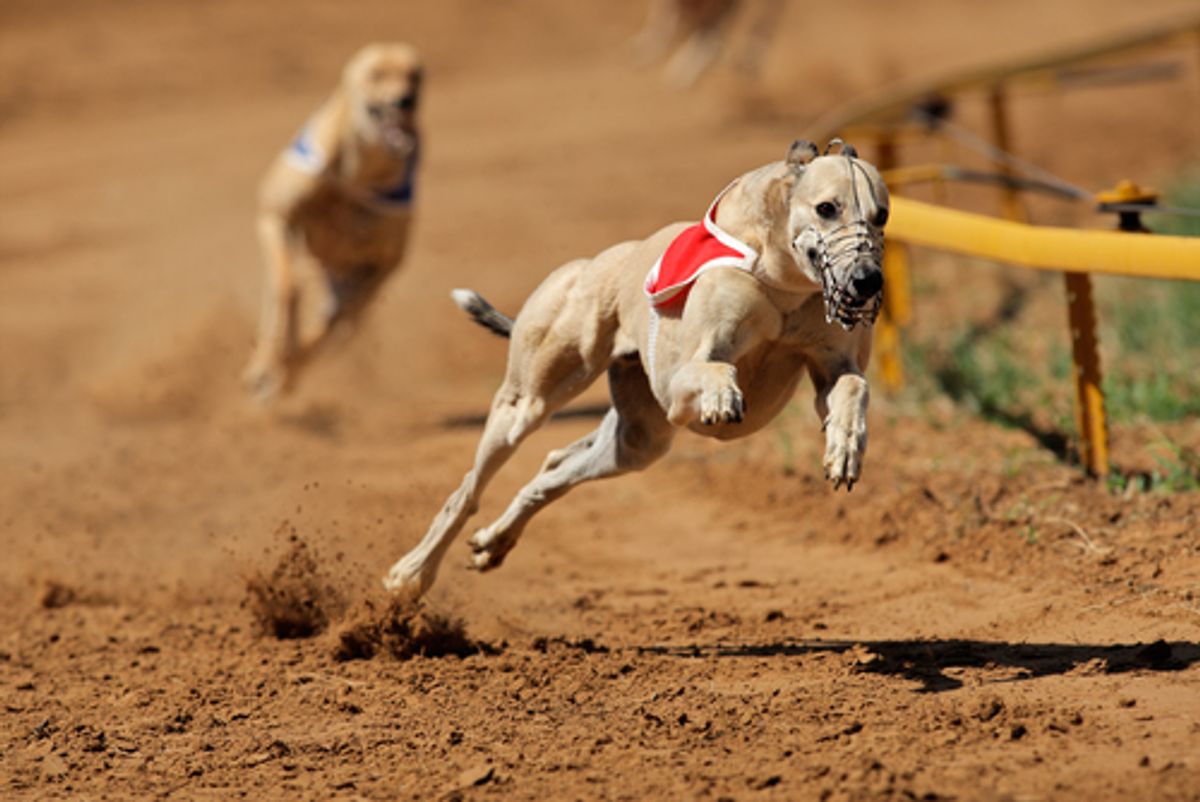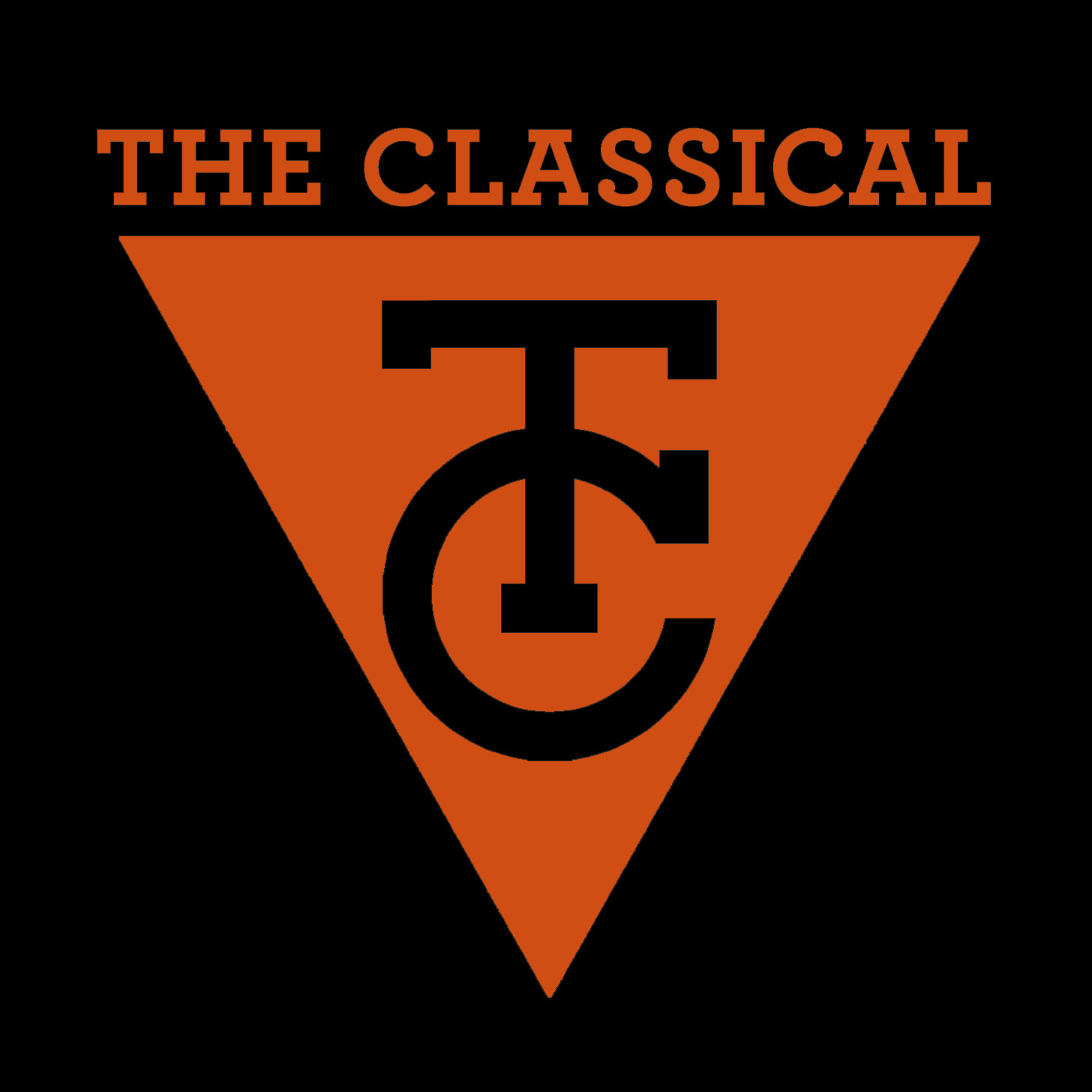"C'mon, Yellow Dog!"
"You can't be poking the dog!"
The bartender pretty transparently hated the idea I had after not quite a whole day of watching dogs race each other in various saddish Floridian racetracks. That idea was perching crows—creatures whose intelligence and hollow bones place them in the top tier of potential fauna-jockeys—on the slim haunches of the greyhounds we had been watching; this was for the express purpose of rectifying this strange sport's most glaring weakness, which is that dog-racing looks and feels and is an awful lot like watching dogs chase each other around, unsupervised.
Since nobody, or nobody with greater cognitive juice than a dog, is calling the shots, it seems that whichever dog has the most advantageous break will finish first. Having placed itself at the forefront of the pack early, and with no strategic mind elucidating counter-strategies to its opponents—and we're talking basics, here, like, say, cutting inside on the rail and pushing the fucker wide, a move which routinely causes the outside hound to lose contact and come down as if on hardwood, whip-like legs flagellating for bite, flailing track medium everywhere, fishtailing wildly before finding the curve—the dog in the front tends to stay in the front.
Which, while making the exception all the more exciting, is anathema to those who settled in, as we had, for a day of staring at televisions showing simulcast race cards and betting on greyhounds running these so-similar races in Palm Beach and Sanford in Orlando.
The clear answer, it seemed, was to attach corvid jockeys to these rollicking little spines, which jockeys would then (gently) press their beaks into the beast's rear legs to effectively steer them where to go. Whether our bartender's objections were of the bleeding heart variety, or perhaps of a more practical concern—my observed sample size was admittedly small; perhaps the pups normally had more give and take, thereby making the no-doubt arduous process of training a murder of jockeys economically unfeasible—I thought it best to listen. So I shut up.
Our reverence for her had been earned. My associate Mack and I had never bet on dogs before, and, one dented bucket of Miller Lites after we sat down, the bartender had taken us under her wing. She had a light bronzing to her skin, and the sun-bleached blonde hair of a longtime Floridian; she seemed a slightly faded star, gregarious and intelligent but surely dulling from her environs. She dutifully sketched in the bare framework of what we needed to do to more effectively waste our time and money.
Behind the bar were two televisions, piping in that hot racing action from Sanford and Palm Beach. She gestured past the television sets to a long row of counters running along the back, the OTB's spinal cord. Using a racing form, Mack and I would pick which dog we wanted for each race at each site—no fancy bets here, only: pick a dog and pray she comes in first—and place the bets on the back row. Then watch the races, drink more beers, place more bets ibid, watch more races, and so on and so forth until either the program or the money ran out.
We quickly settled on a system; whichever name struck our fancy was our choice. Explaining our methods to the young man taking the bets, he told us it was as good as any. "It's the guys thinking too much who tend to lose," he assured us. I, for one, was confident in the Matronymic Method. "We can't overthink this," I explained, "because we literally know nothing."
To know dog racing, as I came to know it, is to know the OTB. At the time of this visit, Tropical Storm Andrea had been having her way with the Tampa Bay area for the better part of a week. The usual near-daily afternoon rain had been replaced by ominous rows of haze-gray clouds falling like funeral veils across the sky; every day big battleship flanks would come knifing in above our heads, letting loose with briefly furious exchanges more than adequate enough to cramp a Florida vacation.
There was no such problem in the Tampa Greyhound Track; in here, the sky was black as a graveyard shift worker's bedroom curtains. It was an artificial sky blocking off the wall of windows which had looked down upon the race track when the pups still ran here, the local environs and reality traded for floating clusters of televisions, broadcasting thoroughbreds and harness racing and the weird wicker sickles of jai alai. The bar sat atop a massive ziggurat of seating, plush green carpet the color of old money faded to olive drab from many jubilant climbs and broken descents. There is rarified but thin air at the top, and not enough luck or oxygen for any one man to stay long.
All of this was contained in a faded grand dame of a stadium, sitting on a stretch of Nebraska Avenue in a part of the city that one imagines does not ebb and flow with tourist season and is instead always sitting somewhere around slack tide. The stadium nevertheless carried a somewhat dignified air; a massive parking lot, indicative of the huge numbers she once attracted, spread about her, and on her side colossal hounds, like the spawn of Cerberus himself, were caught forever in mid-flight, taunt as a garrote.
Atop the ziggurat, face to face with the compound eyes of televisions, one could float, rather stoically, upon a low murmur, the buzz generated when any number of people gather together, punctuated by undulating, rhythmic Spanish. This comforting din was a facade, however. Whenever one of the popular horse races would go off, the murmur quickly rose to a tumult, with incantations and pleas and admonitions directed at numbers, at wall-mounted televisions, the cacophony reaching climax as the ponies nosed the line, ending in a glorious existential note—ecstasy, agony, and bitter indifference all at once, the whole harmony of the human condition. Mack added his own contribution to the symphony, a raw-throated repeating cry of "C'mon, yellow dog!" which he had picked up from a trackgoer on an earlier—bet free—visit and delivered regardless of his chosen hound's blanket color.
***
If we're being honest: this was all background noise, a din distracting us from our brutal new addiction. We quickly got a taste for the dogs, for the steady rhythm of drain a beerpick a pupplace a betwatch the two non-flat screen, non-HD televisions mainlining us our greyhound fixgrumble/collect winnings accordingly. My first pick of the day was Little Lulu, a slim black number, going off at 20-1 in Palm Beach, and the speed of the sport—and resolution of the TV—was such that I had no idea I'd won until the bartender graciously pointed it out. Lulu would be the first in a string of six or so such wins; I was, however briefly, the King of Palm Beach, ruling by proxy from my throne on the Great Green Ziggurat, beneath black skies on Nebraska Avenue.
To see a greyhound run is a marvelous thing, as great and beautiful and natural as a thoroughbred and twice as funny. They are little bundles of lean muscle, with legs like parentheses, spines like S's and the pointed snouts of a harpoon; when the gates open up and the lure races by, these parenthetical expressions come bounding out of the bunkerlike starter box, jowls peeled back in maniacal smiles, all turnover and pigeon head bob, decompression and re-compression, S to line segment, S to line segment.
These are the most ludicrous pictures of athleticism outside of professional wrestling, and there is some innate joy in it, on both sides of the convex low-def screen. It is beautiful and strange, and a full slate of races is hypnotic in its repetition and addictive for its brevity. Eventually, Mack and I were joined by a third, Parish, a Jovian fellow of congenial disposition who coached the finest scholastic nine of imported Caribbean ringers in the Tampa Bay area by day and dropped hundreds on said environs' renowned strippers by night. Together we wiled away Andrea's wrath; straight bet, drink, watch.
Orlando had been particularly cruel to me all day, and there was something nicely dyadic about a crushing loss in Sanford ending a day that began with a glorious win in Palm Beach. The last race on the docket featured a bruiser named Nitro Super Duty, a yoked black-and-brindle behemoth, with dimensions seemingly more in common with the horses than his fellow hounds. Parish hooted with glee when they paraded Nitro before the cameras. "He's fucking huge!" he exclaimed.
I had high hopes for my own choice, Oshkosh Irena. I was, I was certain, due on that fucking track, and the white tickled Irena seemed the perfect foil for that behemoth. Oshkosh broke from the box strong, seemingly in position to win as the pack approached the ever-important first curve, when Nitro Super Duty, true to his name, kicked on the afterburners. Barreling through the field, he knocked Oshkosh askew, easily pulling away with his only competition rolling about in the dirt. Parish had placed all his remaining money on NSD; Mack's dog was lost hopeless in the pack; I was still in shock at Oshkosh's laying low. Together, we struck the bittersweet Off Track harmony perfectly; the existential triad.




Shares